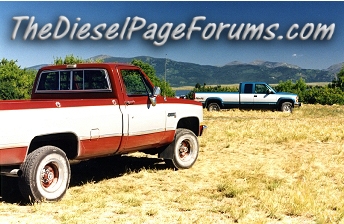

-

I can usually find tech info that can either support or weaken a particular point of view.
I did a little digging today looking for information regarding whether a turbocharged or a naturally aspirated diesel engine delivered better fuel economy in light-load applications, such as our scenario #1. The following information is generic in nature, not specifically targeting the 6.2/6.5 diesel engines. However, this might be useful to help us learn more about the subject. Seems Heinz Heisler isn’t all that secure in one particular point of view either.
Excerpts from Advanced Engine Technology by Heinz Heisler
Argument for naturally aspirated:
Page 316: “Consequently, under light load and low engine speed conditions the energy released along with the exhaust gases will be relatively small and is therefore insufficient to drive the turbine assembly at very high speeds. Correspondingly, there will be very little extra boost pressure to make any marked improvement to the engine’s torque and power output in the low-speed range of the engine. Thus, in effect, the turbocharged engine will operate with almost no boost pressure and with a reduced compression ratio compared with the equivalent naturally aspirated engine. Hence, in the very low speed range, the turbocharged engine may have torque, power outputs and fuel consumption values which are inferior to the unsupercharged engine.”
Argument for turbocharging:
Page 343: “Turbocharging diesel engines can reduce the specific fuel consumption from about 3% to 14% in the engine’s speed range. The reduction in fuel consumption becomes more marked as the engine’s load is reduced, as can be seen in the family of constant load (b.m.e.p.) curves ranging from
 Posting Permissions
Posting Permissions
- You may not post new threads
- You may not post replies
- You may not post attachments
- You may not edit your posts
-
Forum Rules









 Reply With Quote
Reply With Quote
